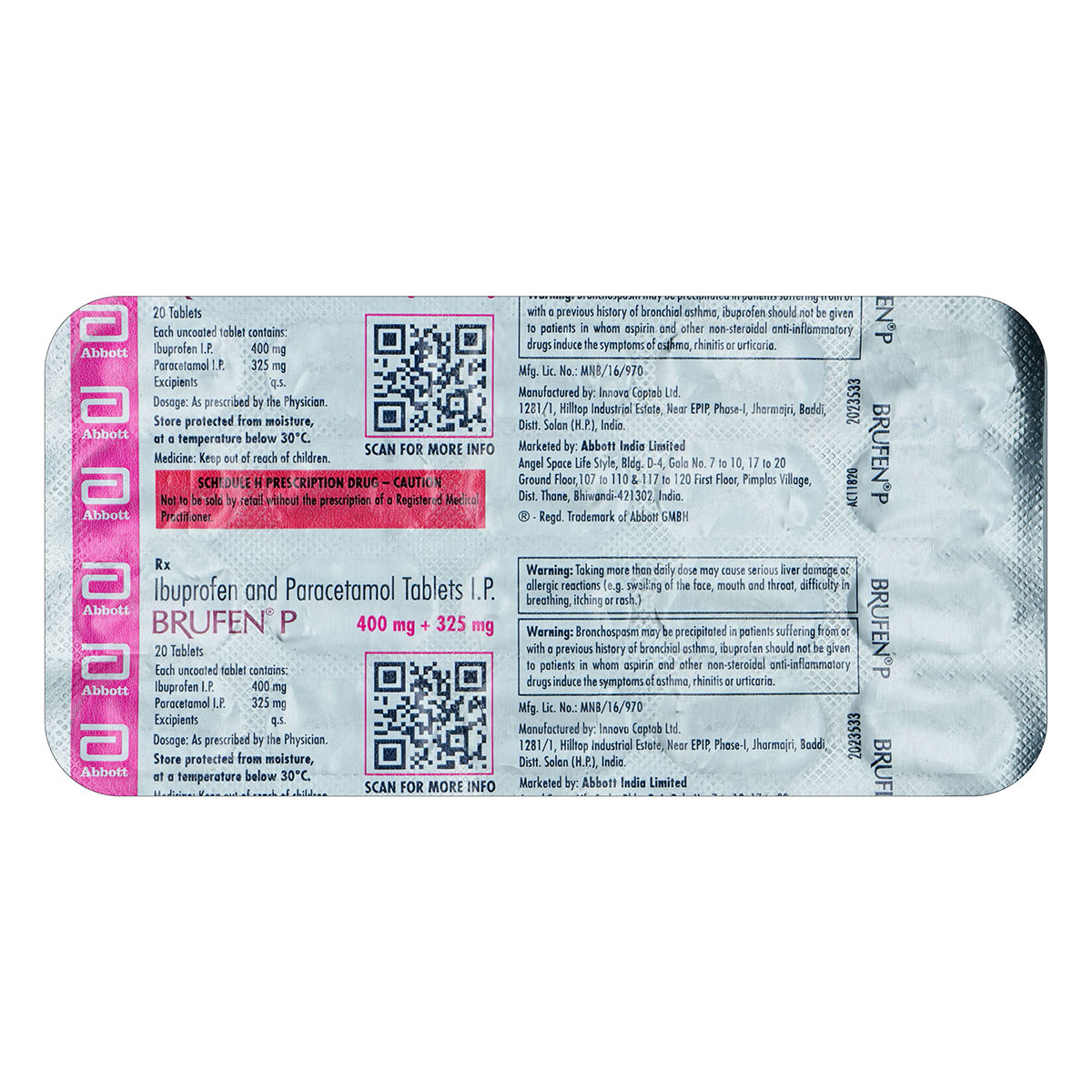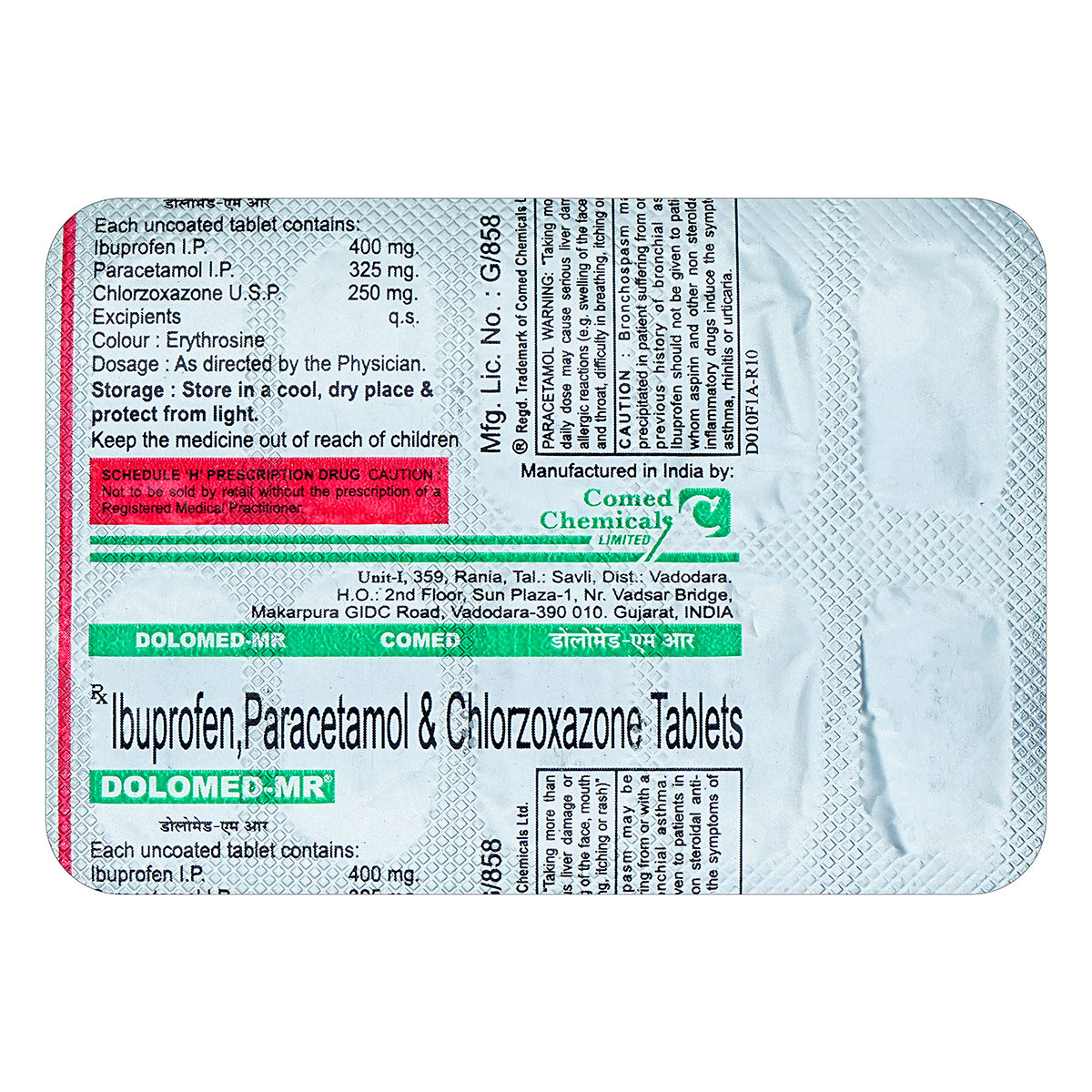Ibuprofen
About Ibuprofen
Ibuprofen is used to relieve mild to moderate pain, inflammation, and fever in adults and paediatrics above 6 months of age. It helps to treat conditions such as menstrual cramps, headache, neuralgia (nerve-related pain), migraine, back pain, dental pain, swelling and stiffness in joints and muscles, cold, and flu symptoms.
Ibuprofen contains 'Ibuprofen', which works by blocking the effect of a chemical messenger in the body. It is known as cyclo-oxygenase (COX) enzymes that make other chemical prostaglandins. These prostaglandins are produced at injury sites and cause pain and swelling. By blocking the COX enzymes' effect, fewer prostaglandins are produced, which reduces mild to moderate pain, inflammation, and fever.
Take Ibuprofen as prescribed by your doctor. You are advised to take Ibuprofen for as long as your doctor has prescribed it for you, depending on your medical condition. In some cases, you may experience certain common side effects, such as indigestion, diarrhoea, constipation, flatulence (gas), general weakness, and dizziness. Most of these side effects do not require medical attention and will resolve gradually over time. However, you are advised to talk to your doctor if you experience these side effects persistently.
Ibuprofen may increase the chances of stomach ulcers, bleeding and the risk of heart attack or stroke. Avoid or limit the intake of alcohol while taking Ibuprofen. Consult your doctor before taking Ibuprofen if you are pregnant or breastfeeding; your doctor will prescribe Ibuprofen only if the benefits outweigh the risks. Ibuprofen may cause drowsiness, so drive with caution. Do not take Ibuprofen for more than 10 days unless prescribed by your doctor. If your condition does not improve even after taking Ibuprofen for 10 days, please consult your doctor.
Uses of Ibuprofen
• Pain Relief: Ibuprofen is widely used to relieve mild to moderate pain, including headaches, menstrual cramps, toothaches, and muscle aches, offering effective comfort.
• Anti-Inflammatory: Ibuprofen reduces inflammation and swelling associated with various conditions such as arthritis and injuries, supporting recovery and mobility.
• Fever Reduction: Ibuprofen is effective in lowering fever in both adults and children, making it a trusted option for managing fever caused by illnesses or infections.
• Post-Surgical Pain Management: After surgical procedures, Ibuprofen is often prescribed to relieve pain and inflammation, aiding in smoother recovery.
• Osteoarthritis and Rheumatoid Arthritis: Ibuprofen plays a role in managing chronic pain and improving joint function as part of treatment plans for osteoarthritis and rheumatoid arthritis.
Medicinal Benefits
Ibuprofen belongs to the group of NSAIDs used to relieve pain and inflammation. Ibuprofen relieves period pain, headache, neuralgia (nerve-related pain), migraine, back pain, dental pain, swelling and stiffness in joints and muscles, cold, flu, and fever symptoms. Ibuprofen works by blocking the effect of a chemical messenger in the body, known as cyclo-oxygenase (COX) enzymes that make another chemical prostaglandins. Prostaglandins are produced at injury sites and cause pain and swelling. By blocking the effect of COX enzymes, fewer prostaglandins are produced, which reduces mild to moderate pain and inflammation at the injured or damaged site. Besides this, it also minimizes fever due to pain and inflammatory conditions.
Directions for Use
- Take Ibuprofen with food to avoid stomach upset or as advised by a doctor.
- Follow your doctor's instructions on the dosage and timing of this medication, to ensure the safety.
- Swallow the medicine as a whole with a glass of water.
- Do not crush, break, or chew it.
Storage
Side Effects of Ibuprofen
- Indigestion
- Diarrhoea
- Constipation
- Flatulence (gas)
- Nausea
- Rash
- Weakness
- Dizziness
Medicines Containing this Salt
View AllDrug Warnings
If you have had any recent heart bypass surgery (CABG), do not use Ibuprofen. Ibuprofen increases the chances of stomach ulcers and bleeding, so do not exceed the dose and duration prescribed by your doctor. Consult your doctor before taking Ibuprofen if you are pregnant or breastfeeding; your doctor will prescribe you Ibuprofen only if the benefits outweigh the risks. Ibuprofen may cause drowsiness, so drive with caution. Do not take Ibuprofen for more than 10 days unless prescribed by your doctor. If your condition does not improve even after taking Ibuprofen for 10 days, please consult your doctor. Avoid consuming alcohol with Ibuprofen as it could lead to increased drowsiness and increase the risk of stomach bleeding. Stop taking Ibuprofen and consult your doctor immediately if you have stomach pain or any signs of bleeding in the intestine or stomach, such as blood in stools. Do not take aspirin or any other NSAIDs for pain relief along with Ibuprofen unless prescribed by the doctor.
Drug Interactions
Drug-Drug Interactions: Ibuprofen may have interaction with pain killers (naproxen, aspirin), anti-depressants (duloxetine, sertraline, escitalopram, fluoxetine), and drugs used to treat arthritis (meloxicam).
Drug-Food Interactions: Avoid consuming alcohol along with Ibuprofen as it could lead to increased drowsiness and dizziness. It could also increase the risk of stomach bleeding.
Drug-Disease Interactions: Inform your doctor if you have/had stomach/intestine ulcer or bleeding, heart failure, fluid retention (oedema), asthma, high blood pressure, hyperkalemia (high levels of potassium), thrombosis (formation of clots), anaemia (low red blood cells), rash, platelet aggregation inhibition, kidney and liver problems.
Drug-Drug Interactions Checker List:
Safety Advice

Alcohol
unsafeYou are recommended to avoid alcohol consumption while taking Ibuprofen. Alcohol intake, along with Ibuprofen, may cause increased drowsiness and the risk of gastrointestinal ulcers and bleeding.

Pregnancy
unsafeIt is not recommended to take Ibuprofen while you are pregnant, especially in the last trimester. Please consult your doctor if you have any concerns regarding this; your doctor will prescribe you Ibuprofen only if the benefits outweigh the risks.

Breast Feeding
unsafeIbuprofen may pass into breast milk. Please consult your doctor if you have any concerns regarding this; your doctor will decide whether breastfeeding mothers can take Ibuprofen or not.

Driving
cautionIbuprofen may cause drowsiness, dizziness, tiredness, and vision disturbances in some cases. So, avoid driving or operating heavy machinery if you experience any of these symptoms.

Liver
cautionDose adjustment may be needed. Ibuprofen should be used with caution in patients with liver impairment/liver disease. Please consult your doctor if you have a liver impairment or any concerns regarding this.

Kidney
cautionDose adjustment may be needed. Ibuprofen should be used with caution in patients with kidney impairment/kidney disease. Please consult your doctor if you have kidney impairment or any concerns regarding this.

Children
cautionIbuprofen is not recommended for children below six months of age, as the efficacy and safety have not been established.
Habit Forming
Diet & Lifestyle Advise
Physical activity helps in strengthening muscles and relieves joint stiffness. Gentle activities like 20-30 minutes of walking or swimming would be helpful.
Performing yoga may also help in improving joint flexibility and pain management.
Maintain a healthy weight by performing regular low-strain exercises and eating healthy food.
Get adequate sleep as resting the muscles can help in reducing inflammation and swelling.
Follow heat or cold therapy. Apply a cold or hot compress on the joints for 15-20 minutes regularly.
De-stress yourself by meditating, reading books, taking a warm bubble bath, or listening to soothing music.
Acupuncture, massage, and physical therapy may also be helpful.
Eat food rich in antioxidants such as berries, spinach, kidney beans, dark chocolate, etc.
Foods containing flavonoids help in reducing inflammation. These include soy, berries, broccoli, grapes, and green tea.
Avoid alcohol consumption.
Patients Concern
Disease/Condition Glossary
Pain: It is not a disease but a symptom triggered by the nervous system, causing uncomfortable sensations in the body. Pain may be dull or sharp; it might be constant or may come and go. The tolerance level of pain might vary from person to person. Pain can be generalized (overall body aches) or localized (affecting a specific area of the body). The common causes of pain include headache, muscle strain, cramps, cuts, bone fractures, arthritis, and certain medical conditions.
FAQs
Ibuprofen is used to relieve mild to moderate pain, inflammation, and fever
Ibuprofen works by blocking the effect of chemical messengers (prostaglandin), thereby reducing pain and inflammation.
Diarrhoea or dehydration might be a side-effect of Ibuprofen. Drink lots of fluids and eat non-spicy food if you experience diarrhoea. If you find blood in stools (tarry stools) or experience excess diarrhoea, consult your doctor. Do not take anti-diarrheal medicine on your own.
Do not take Ibuprofen for more than 10 days unless prescribed by your doctor. Taking Ibuprofen for longer durations or high doses may cause a heart attack or stroke. Do not exceed the dose and duration prescribed by your doctor.
Ibuprofen may increase the risk of heart attack or stroke. Therefore, consult your doctor before taking Ibuprofen if you have heart problems. Do not use Ibuprofen immediately before or after bypass surgery like CABG.
Taking Ibuprofen with or after food or milk may partially reduce stomach side effects such as indigestion.
Ibuprofen can be used for relieving period pain and cramps if prescribed by the doctor. Do not exceed the dose and duration prescribed by your doctor.
No, you should not take Ibuprofen during pregnancy especially during late pregnancy, like other NSAIDs, as it may cause premature closure of the ductus arteriosus (a blood vessel that connects fetal pulmonary artery to aorta before birth and closes after birth). However if you have concerns consult your doctor.
Yes, Ibuprofen can cause stomach pain. It is a common side effect of Ibuprofen. To reduce the risk of stomach discomfort, it's recommended to take the Ibuprofen with food or milk. If you experience persistent or severe stomach pain, it's important to consult doctor for advice.
Yes, Ibuprofen can be effective in treating headaches. However, it's important to follow the dosage instructions on the packaging and consult with your doctor if you have any underlying health conditions or are taking other medications.
You should take Ibuprofen exactly as prescribed by the doctor. Do not exceed the recommended dosage as this could result in an overdose.
Ibuprofen is generally considered safe when used as directed by your doctor. However do not exceed recommended daily dosage.
If you forgot to take a dose of Ibuprofen, take it as soon as you remember. However, if it is almost time for your next dose, skip the missed dose and go back to your regular schedule. Do not take the double the dose as this can increase the risk of side effects.
If Ibuprofen is prescribed for short term, it can be discontinued when the pain is relieved. However, it's always a good idea to follow your doctor's advice regarding the duration of use, especially if you have been prescribed a specific course of treatment.
Yes, Ibuprofen can cause nausea and vomiting in some people as these are the side effects of Ibuprofen. To help reduce the risk of these side effects, it's recommended to take the tablet with food or milk. If you experience persistent or severe nausea and vomiting, it's important to consult your doctor for advice.
Ibuprofen is contraindicated in patients with known hypersensitivity to Ibuprofen, and in patients with urticaria, asthma, or allergic reactions after taking aspirin or NSAIDs. Also, it should not be used for treating perioperative pain during coronary artery bypass graft (CABG) surgery. It's important to discuss your medical history with your doctor before taking the Ibuprofen to avoid potential interactions.
Ibuprofen is generally not recommended for relieving stomach pain, if you're experiencing stomach pain, it's best to consult your doctor.
Yes, Ibuprofen can cause kidney damage, especially with long-term use or in higher doses. Ibuprofen can reduce blood flow to the kidneys, which may lead to acute kidney injury. Symptoms of kidney damage can include producing less urine, swelling in the arms, legs, or feet, and nausea. If these symptoms persist or worsen, please consult your doctor.
It's unsafe to exceed the recommended dose of Ibuprofen, as it can cause serious side effects like stomach ulcers, gastrointestinal bleeding, kidney damage, and liver damage. Always follow the dosage instructions on the packaging or as prescribed by your doctor. If you have any concerns or experience any side effects, consult your doctor.
Yes, Ibuprofen can cause dizziness in some people. This is a less common side effect, but it can happen. If you experience dizziness, it's a good idea to sit or lie down until you feel better and avoid activities that require full alertness. If dizziness persists for long time, consult your doctor.
The common side effects of Ibuprofen are indigestion, diarrhoea, constipation, flatulence (gas), nausea, rash, weakness, dizziness. If these side effects persist or worsen, please consult your doctor.
You are recommended to avoid alcohol consumption while taking Ibuprofen. Alcohol intake, along with Ibuprofen may increase drowsiness and raise the risk of bleeding and stomach ulcers.




















